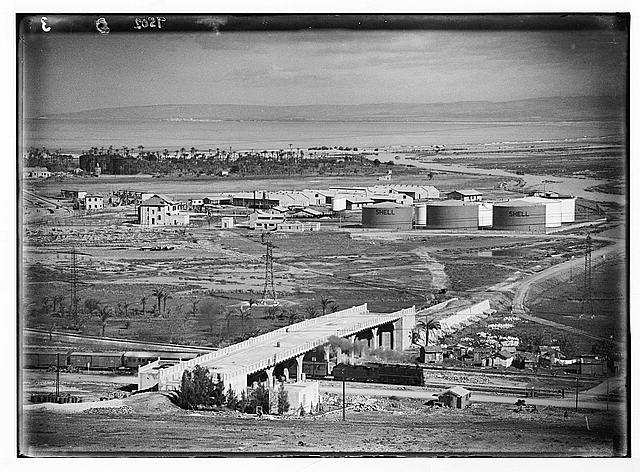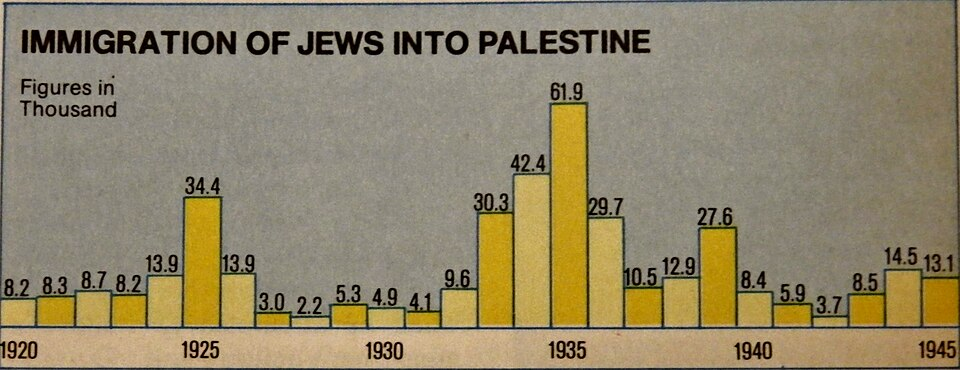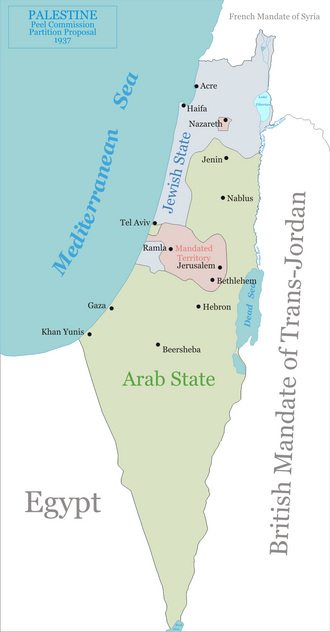IB Syllabus focus:
'Study the Palestine mandate, including economic, social, and political developments, the impact of Jewish immigration and settlement, and British responses and policies regarding the Arab–Jewish dispute up to 1945.'
Introduction
The British Mandate for Palestine, a legal commission granted by the League of Nations, profoundly shaped the region’s economic, social, and political fabric from 1920 to 1945. This period was pivotal in laying the groundwork for the complex tapestry of modern Middle Eastern geopolitics.
Historical Context
Establishment of the Mandate
Post-World War I, the League of Nations instituted mandates for administering former Ottoman territories.
Britain was assigned the Mandate for Palestine, effective from 1923, formalising their control over the territory.
Jewish National Aspirations
The rise of Zionism, as a response to European anti-Semitism, propelled efforts for establishing a Jewish homeland.
Britain’s Balfour Declaration of 1917 signalled support for Jewish national aspirations, fuelling Jewish immigration to Palestine.
Economic Developments
Agricultural and Industrial Growth
Introduction of collective farming kibbutzim and advanced agricultural methods by Jewish settlers revitalised agriculture.
Industrial zones emerged, fostering economic independence within Jewish communities.
Infrastructure Improvements
Major infrastructural projects, such as the port of Haifa and the expansion of railroads, facilitated trade and mobility.

The Haifa oil terminal with “Shell” storage tanks and a rail bridge, c.1934–1939, exemplifies the British Mandate’s strategic infrastructure that tied port, pipeline, and rail systems into a regional hub for trade and fuel distribution. The integration of rail and port facilities accelerated economic activity in the 1930s. Source
Jewish investment led to the electrification and modernisation of multiple sectors.
Social Developments
Demographic Changes
A significant wave of Jewish immigrants arrived in the 1920s and 1930s, fleeing European anti-Semitism and later Nazi persecution.

Annual Jewish immigration to Mandatory Palestine, 1920–1945, with visible spikes in the mid-1930s and wartime fluctuations. The trend complements census growth figures and contextualizes political tensions over immigration policy. Source
Jewish population figures surged from approximately 83,000 in 1922 to over half a million by 1945.
Cultural Impact
Institutions like the Hebrew University and the Technion were established, becoming intellectual hubs.
Cultural revivalism was evident in literature, arts, and the revival of the Hebrew language.
Political Developments
British Administration
Britain instituted civil governance, with structures allowing limited local participation.
The High Commissioner for Palestine held significant power, overseeing the administration.
Arab-Jewish Relations
Tensions escalated as Arab populations perceived a threat to their land and political future.
Repeated Arab protests and strikes culminated in the 1936-39 Arab Revolt, demanding an end to Jewish immigration.
Jewish Immigration and Settlement Impact
Economic and Technological Contributions
Jewish immigrants introduced diverse skills, capital, and innovation, which bolstered the economy.
Agricultural modernisation occurred with the introduction of new farming techniques and crops, particularly enhancing citrus exports.
Land Ownership and Arab Displacement
Jewish National Fund's land purchases for Jewish settlement often led to the eviction of Arab tenant farmers, exacerbating tensions.
The issue of land dispossession became increasingly central in the Arab-Jewish conflict.
British Policies and Responses
Immigration Quotas
The British government issued several White Papers, including the 1939 White Paper, which severely restricted Jewish immigration, in reaction to Arab unrest.
These quotas limited Jewish immigration during a critical time of Jewish refugee crises in Europe.
Land Transfer Regulations
To address Arab concerns, Britain restricted Jewish land acquisitions, particularly in areas with significant Arab populations.
These regulations were controversial and widely opposed by the Jewish community.
Political Proposals
Various proposals were suggested, including partition and federal solutions, attempting to resolve the impasse.

The Peel Commission’s 1937 partition proposal delineated a Jewish state (blue), an Arab state (green), and an international zone (pink) encompassing Jerusalem and the corridor to the coast. While never implemented, the plan framed later debates about partition and governance. Source
Proposals for independent governance were met with scepticism and opposition from both communities.
Security Measures
The British response to Arab revolts and Jewish underground activities included military reinforcements and the imposition of martial law in some areas.
Commissions like the Peel Commission (1937) and the Woodhead Commission (1938) were established to investigate the conflict and propose solutions.
Arab-Jewish Dispute up to 1945
Escalation of the Conflict
The Arab Revolt of 1936-39 marked the peak of Arab resistance to British rule and Jewish immigration.
British efforts to suppress the revolt led to widespread destruction and a breakdown of Arab political organisation.
Impact of WWII
The Second World War saw Jewish enlistment in Allied forces, while some Arab leaders’ associations with Axis powers undermined their post-war legitimacy.
The Holocaust intensified the Zionist case for a Jewish state, heightening the moral imperative for a homeland.
The Path to Partition
By the end of WWII, it was evident that the Mandate was unsustainable, leading to the UN involvement.
The 1947 UN Partition Plan proposed a division of Palestine into separate Jewish and Arab states, indicating the end of the British mandate.
Challenges and Controversies
Balancing Mandate Obligations
Britain faced significant challenges in balancing its commitments to the Jewish and Arab populations, as stipulated by the Mandate and the Balfour Declaration.
The mandate’s dual obligations led to contradictions and governance issues, with each community feeling that their aspirations were being compromised.
International Pressure
International advocacy for Jewish immigration grew, especially from Zionist movements and sympathisers in the United States and Europe.
Britain contended with this pressure against a backdrop of increasing violence and opposition from Arab inhabitants.
Legacy of the Mandate
The Mandate period set in motion the dynamics that led to the establishment of the state of Israel in 1948.
The unresolved Arab-Jewish dispute, and the end of the Mandate, left a legacy of conflict that continues to affect the region and international relations.
In summary, the Palestine Mandate era encapsulates a tumultuous period of nation-building, identity formation, and emerging sovereignty that laid a complex foundation for the enduring conflict in the Middle East. British governance was marked by constant negotiation between appeasement, administrative pragmatism, and international obligations, a balancing act that ultimately proved unsustainable as the region moved towards partition and the end of colonial influence.
FAQ
The Arab Revolt of 1936-1939 was primarily ignited by Arab frustration with British policies that appeared to support Jewish immigration and land purchases, which they perceived as threats to their aspirations for self-governance and to their livelihoods. The immediate consequences for the British administration included a realization that their policy of supporting Zionism was unsustainable without addressing Arab concerns. The revolt forced the British to reassess their position, leading to the 1939 White Paper, which limited Jewish immigration and land purchases. However, this only served to alienate Jews without fully assuaging Arab grievances, ultimately undermining the legitimacy of British rule and setting the stage for the eventual end of the Mandate.
The international community, especially through the League of Nations, which had established the mandate system, had a significant influence on the administration of the Palestine Mandate. Britain, as the mandatory power, was responsible to the League for the administration of the territory, including the implementation of the Balfour Declaration. International Jewish organizations influenced the administration through lobbying and financial support for Jewish settlement. Additionally, global public opinion, particularly from countries with significant Jewish populations, such as the United States, applied pressure on the British government to facilitate the establishment of a national home for the Jewish people, influencing immigration policies and the Mandate's administration.
Jewish immigration during the Mandate period led to significant socioeconomic changes, which were reflected in the urban landscape of Palestine. Cities like Tel Aviv saw remarkable growth and became hubs of modernity and economic activity, showcasing new architectural styles and urban planning concepts. Jewish immigrants, many of whom were from Europe, brought with them contemporary ideas and capital, which facilitated the establishment of businesses, cultural institutions, and healthcare facilities. The burgeoning economy, driven by both immigration and investment, led to improved infrastructure, including roads, ports, and public services, which transformed urban areas into more modern spaces compared to their pre-Mandate counterparts.
The Peel Commission, established in 1936, was significant as it was the first to propose a two-state solution to the Arab-Jewish conflict, recommending the partition of Palestine into separate Jewish and Arab states. The Jewish community was divided over the Commission's recommendations; some Zionists welcomed the possibility of a sovereign Jewish state, albeit much smaller than they had hoped, while others rejected the notion of giving up claims to parts of historic Palestine. The Arab community almost uniformly rejected the partition plan, viewing it as a betrayal of their national aspirations and a formal endorsement of the Jewish state. The Commission's recommendations ultimately were not implemented, but they laid the groundwork for future debates on the partition and highlighted the deep-seated divisions between the communities.
During the Mandate period, the Zionist movement gained momentum due to several factors. The harsh realities of anti-Semitic persecution in Europe, culminating in the Holocaust, lent urgency to the Zionist cause for a Jewish homeland. Internationally, the Zionist movement was well-organised and able to lobby effectively for support, particularly in Britain and the United States. The issuance of the Balfour Declaration was a diplomatic victory for Zionists, and it encouraged increased Jewish immigration to Palestine. Additionally, international Zionist organizations like the Jewish Agency for Palestine played a critical role in the politics of the region by financing immigration, purchasing land, and building institutions that laid the groundwork for a future state.
Practice Questions
The British policies during the Mandate period significantly influenced the Arab-Jewish relationship, often exacerbating tensions. The Balfour Declaration and subsequent British support for the Zionist movement stirred Arab fears and led to a sense of betrayal among Arab populations. Policies such as the 1939 White Paper, which limited Jewish immigration, were seen as too little, too late by Arabs and a betrayal by Jews, particularly as it came at a time when European Jews were seeking refuge from Nazi persecution. These policies, intended to placate both sides, often resulted in mutual distrust and heightened conflict, setting the stage for the enduring strife in the region.
Economic and social developments during the Palestine Mandate greatly influenced political changes. Jewish immigration brought capital and labour, leading to agricultural and industrial growth. This economic prosperity underpinned the Jewish community's increasing demands for political autonomy. Meanwhile, social developments, such as the cultural revival and demographic shifts, further solidified Jewish identity and aspirations. Conversely, economic and social changes for the Arab population often manifested as displacement and economic insecurity due to Jewish land acquisition. This led to political mobilisation against both Jewish immigration and British policies, resulting in uprisings like the Arab Revolt of 1936-39, which sought to pressure the British into limiting Jewish immigration and land purchases. These intertwined economic, social, and political threads laid the groundwork for the future partition and conflict.

